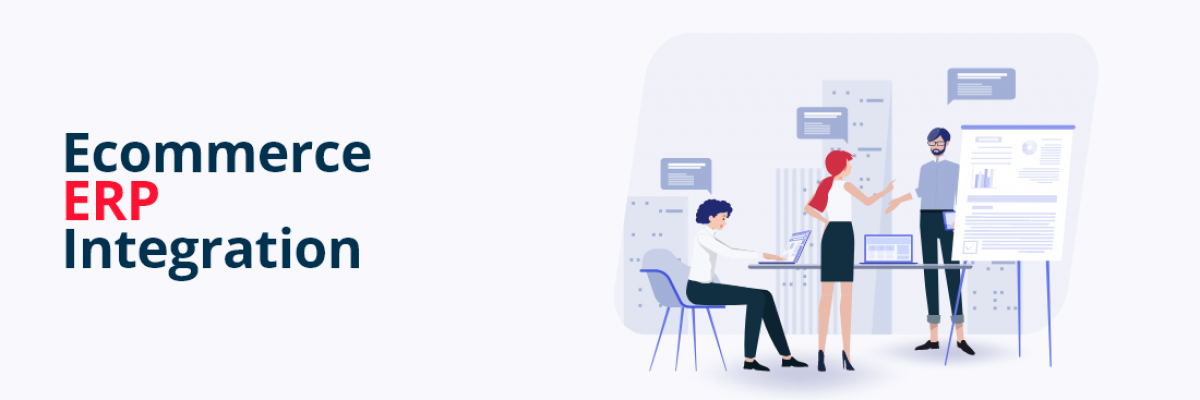Everything You Need to Know About Ecommerce ERP Integration
Ecommerce has changed the way of selling and buying the products. Nowadays many retailers are making use of an online store to sell their products. However, maintaining a large-scale ecommerce store can be a huge, and arduous stress for retailers. The retailer has to manage the inventory, payment process, customer information, and also simultaneously provide customer service.
For a retailer who is not well versed in the technical aspect, it will be difficult to handle the management process. For this, automation is the only way for the retailer to handle the complex repetitive tasks. But automation is not possible without the help of the ERP system.
ERP manages the business process such as inventory, customer support services, human resources, sales, accounting, CRM, etc. It also creates a streamline flow of information for your business.
ERP does come along with ecommerce software. If you run ERP as a separate system, then the seamless operation and enhanced customer experience will not be possible. Integrating ERP with your ecommerce store help in improving operational flow in your entire business.
Reasons for integrating ERP with ecommerce
When you use the ecommerce platform and ERP separately, they run smoothly for a certain time that is until your business needs are simple. But when business becomes complex and traffic to your site is high, a separate ERP will not support your ecommerce needs and it demands an integrated one.
When an ecommerce business is expanded or new services are added, it needs to handle a huge amount of information exchange. Manual data entry and transfer from ecommerce platform to the ERP system will take a lot of time and accuracy, but it will sometimes end up in delay, wastage of resources and error.
Sometimes you may think that integrating ecommerce with ERP will be costly and needs more effort while integrating with an ecommerce platform. However, the benefits of the end result are much more the effort you have done for integration.
Benefits of using ERP in ecommerce
Integrating ERP with an ecommerce platform not only automates the information management process but also increases the system performance by giving a real-time view of the data. Simply businesses that integrate the ERP system enjoy high traffic and conversion rate, streamlined performance, seamless operation, and enhanced customer services. Here are some of the reasons why you need to integrate ERP with ecommerce.
1) Streamline inventory synchronization
Inventory management is a crucial task since it needs synchronizing with both sales and stock. ERP automates major tasks like stock managing, purchase management, payment functionality and report & analytics of inventory. Also, it handles real-time inventory and provides transparent services for customers. Accurate inventory handling in real-time enables the customers to automatically contact the sellers when the product is being shipped or tracking is delayed.
2) Location-independent and centralized repository
In ecommerce, your services must be available anywhere and anytime without any downtime. This is possible when there were no dependency and waiting in handling customer services. ERP offers a centralized repository to respond to a user query with no downtime.
ERP uses single storage to your data that help in improving the performance. The centralized repository will boost inter-department collaboration.
3) Scale to demand
ERP is made of a modular design and a full structured database. So, it allows in adding more features to it and can handle high traffic without any downtime in the services. ERP facilitates your ecommerce to grow rapidly.
4) Seamless customer services
According to the Guardian, by 2020, the quality of customer experience provided by a brand will be more important than price and product as a key differentiator.
ERP helps in providing personalized customer services. Ecommerce sellers can interact with the customer better and improve their relationship with them through accurate access to customers' information and history. It also helps in ensuring that through marketing automation, the customers are being interacted with you consistently.
Customer records are updated immediately, and if there is any cancellation, the inventory figures reflect the change immediately.
5) Improved productivity
Small businesses experience a 36% reduction in the time it takes to make decisions because of ERP.
ERP streamlines and speeds up multiple business processes. It eliminates repetition in business processes and tedious manual tasks, as well as improve the process of receiving customer feedback – which saves employees valuable time.
It improves the fastness of sales order with accurate customer details, real-time updating of the inventory, instant order tracking, and handling automation in the back-office process. Thus, the time consumed in the order fulfillment is reduced and the efficiency is increased through this integration. Manual entry of the customer details results in human error but the integrated site can double-check figures for consistency to validate the incoming data.
6) Cost reduction
According to the Aberdeen Group, 96% of growing businesses who excel in their respective industries rely on an ERP system.
Automatic inventory updating and another business process like generating auto report and analytic information sharing reduce the extra cost. Moreover, optimized planning for the purchase and multiple orders reduce the inventory cost.
7) Operating Efficiencies
The integration of ERP ensures that every department gets access to operating data in real-time to reduce delays, trigger ordering alerts and reduce labor costs. Paperwork is reduced because the information is stored securely in the company databases where everyone who needs the data can get the intelligence instantly access in multiple ways.
It compiles information from multiple online sales channels and speed the reordering of products and supplies, update inventory levels, predict seasonal adjustments and track inventory in real-time to predict sales levels.
Integrating an ERP and ecommerce store
Technology naturally becomes more flexible over time. There are many options to integrate ERP with ecommerce platforms such as custom solutions, multichannel management, or point-to-point options.
No one option is necessarily better than another, they simply provide different benefits that may or may not suit your unique business. First, understand where your data should be live. Then, map out where each data element is stored, and which system is in charge of holding that data. Once you have a good understanding of where your data resides, you can choose the best integration methodology for that data.
Using a third-party integration tool
-
Point to point
-
Custom ecommerce ERP integration
-
Multichannel Management Platform
Point to point connector
Point to point solution is an affordable option for smaller businesses. In this method, the ecommerce arm of your business is pointed at your ERP to exchange information and keep data in sync. It simplifies the management process and eliminates any data between systems that require additional management.
This approach works perfectly for a smaller operation whose sales are slow and steady. But if your business is experiencing drastic growth or you anticipate additional sales channels shortly, it’s likely better to select an ERP solution that can evolve along with your business.
The custom ecommerce ERP integration
A custom ecommerce integration is used if your backend systems require special handling. For example, if you have plenty of APIs in multiple systems, it needs to be interconnected to ensure that data flows seamlessly to and from your company’s many data boroughs. If your business runs like no other, then this is the option for you. If not, a standardized approach can be the best option without having to spend extra time and money.
Multichannel management platforms
The multi-channel method supports growth that can otherwise be cumbersome in point to point configurations and prohibitively expensive in custom configurations. It provides a hub between systems and synchronizes data from multiple channels. The often cloud-based multichannel management platform offers the best of both worlds with an affordable, yet robust, opportunity to streamline your operation.
The perfect Ecommerce ERP Integration
What makes your business to grow in the future and stand in the competitive world? It is with the help of the right strategy and support tools like ERP in the case of ecommerce.
Ecommerce ERP integration can help you maintain good data integrity, remove redundancies, improve productivity and grow your business efficiently. It also helps you provide better customer service and keep your online sales high.
At Purchase Commerce, we offer a flexible ecommerce platform for you to integrate the necessary tools like ERP to support the growing needs of your business. For any ecommerce solutions, you get in touch with our team to build a successful ecommerce business.








